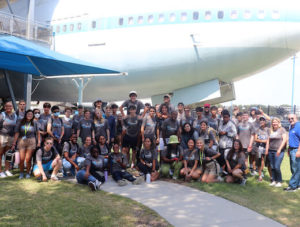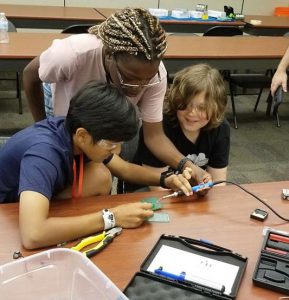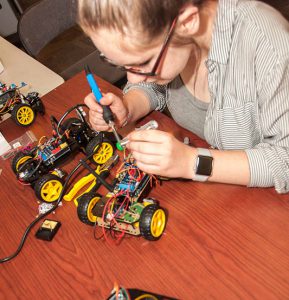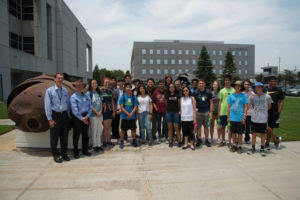What are the Types of Engineering?

The world of engineering offers many different paths for those who love innovation and problem-solving. From designing the structures that shape our cities to developing the machines that power our lives, engineers play a vital role in shaping the world around us. In this article, we’ll delve into some of the most popular types of engineering, exploring what each discipline entails, the educational journey required to become one, and most importantly, how to identify which exciting branch of engineering best aligns with your skills and interests. So, whether you’re fascinated by the intricate workings of machines or dream of building sustainable solutions for the future, there’s sure to be a perfect engineering specialty waiting to be discovered!
The Most Popular Types of Engineering
This section of the article explores some of the most popular types of engineering, providing a glimpse into their core functions, educational pathways, and how to determine if a particular discipline aligns with your interests.
Here, we’ll delve into the “Big Five” of engineering disciplines that consistently rank high in popularity and provide the foundation for countless innovations:
-
Civil Engineering: The masterminds behind our infrastructure, civil engineers design and build the structures essential to our daily lives. From towering bridges and expansive highways to sustainable water treatment systems, their work shapes the very fabric of our communities.

-
Mechanical Engineering: Ever wondered how machines tick? Mechanical engineers bring intricate concepts to life, designing, developing, and building everything from household appliances to complex robots and aerospace machinery.

-
Electrical Engineering: The invisible force that powers our world is the domain of electrical engineers. They design and develop electrical systems, including power generation, transmission, and distribution, as well as the electronic devices that have become an integral part of modern life.

-
Chemical Engineering: Chemical engineers are the masterminds behind large-scale chemical processes, developing methods to produce a vast array of products, from life-saving pharmaceuticals and clean fuels to everyday items like plastics and food.

-
Computer Engineering: In today’s digital age, computer engineers play a pivotal role. They design and develop the hardware and software that power our computers, smartphones, and countless other devices, shaping the way we interact with technology.

How to Become an Engineer
Transforming your fascination with problem-solving and innovation into a fulfilling engineering career requires dedication and strategic planning. The journey begins with a strong academic foundation. Focus on acing your math and science courses, particularly calculus, physics, and chemistry, during high school. This equips you with the essential knowledge needed for engineering programs. The next step is pursuing a bachelor’s degree in your chosen engineering field from an accredited university. Remember, there’s a vast array of specializations to explore (check out our previous section on popular types of engineering!). While a master’s degree is optional for some professions, it can provide deeper expertise or prepare you for research-oriented roles.
Building practical skills is equally important. Seek internships related to your chosen field to gain valuable hands-on experience. Participating in engineering projects, either independently or collaboratively, allows you to apply theoretical knowledge to real-world challenges. Additionally, hone your technical skills by mastering software and tools commonly used by engineers in your specific discipline.
The key to a successful engineering career lies in finding the perfect fit. Research different disciplines to identify the one that aligns best with your interests and strengths. Connect with professionals in various fields to gain insights into their daily work and career paths. Finally, don’t forget to self-assess your skills, interests, and preferred work environment. This introspection will guide you towards the engineering specialization that perfectly complements your unique strengths and passions.
Different Types of Engineering Jobs
We’ve explored the academic path to becoming an engineer and the various specializations available. Now, let’s delve into some popular career options within each of the “Big Five” engineering disciplines:
1. Civil Engineering:
- Structural Engineer: Designs the load-bearing framework of buildings, bridges, and other structures.
- Transportation Engineer: Plans, designs, and oversees transportation systems like roads, highways, and mass transit networks.
- Geotechnical Engineer: Analyzes soil and rock properties to ensure the stability of foundations and structures.
- Water Resources Engineer: Develops sustainable water management systems for irrigation, sanitation, and flood control.
2. Mechanical Engineering:
- Machine Design Engineer: Creates and develops new machinery, from medical devices to robots and industrial equipment.
- Automotive Engineer: Designs and develops vehicles, focusing on components, systems, or entire vehicle platforms.
- Manufacturing Engineer: Optimizes production processes to ensure efficiency, quality, and safety in manufacturing facilities.
- HVAC Engineer: Designs heating, ventilation, and air conditioning systems for buildings and industrial spaces.
3. Electrical Engineering:
- Power Systems Engineer: Designs and manages electrical power generation, transmission, and distribution systems.
- Electronics Engineer: Develops and designs electronic circuits and devices used in computers, smartphones, and other electronic equipment.
- Controls Engineer: Designs and implements control systems for automated machines and processes in various industries.
- Telecommunications Engineer: Develops and manages telecommunication infrastructure, including cellular networks and internet technologies.
4. Chemical Engineering:
- Process Engineer: Designs and optimizes chemical processes for large-scale production in refineries, chemical plants, and other facilities.
- Biomedical Engineer: Applies engineering principles to develop medical devices and implants, such as artificial organs and prosthetics.
- Environmental Engineer: Develops solutions to environmental challenges like pollution control, waste management, and sustainable resource utilization.
- Materials Engineer: Researches and develops new materials with specific properties for various applications, such as stronger building materials or more efficient solar cells.
5. Computer Engineering:
- Hardware Engineer: Designs and develops computer hardware components like processors, memory chips, and circuit boards.
- Software Engineer: Writes and develops software applications for computers, mobile devices, and other computing systems.
- Computer Systems Engineer: Designs, builds, and maintains computer networks and data centers.
- Robotics Engineer: Develops and programs robots for various applications, including manufacturing, automation, and exploration.
What Type of Engineering is the Best?
Unveiling the “best” type of engineering is more about uncovering your ideal fit than a singular “best” choice. Your interests, skills, and career aspirations all play a crucial role in steering you towards the perfect engineering discipline.
Consider your natural talents and what sparks your curiosity. If you’re mechanically inclined and love taking things apart, mechanical engineering might be your calling. Does sustainability and environmental protection fuel your passion? Environmental engineering could be your path. Identifying what excites you is the first step.
Next, think about your dream work environment. Do you envision yourself designing cutting-edge medical devices to improve lives? Dive deeper into biomedical engineering. Perhaps you’re captivated by large-scale infrastructure projects? Civil engineering might be the key. Consider the problems you’d like to solve and the industries that resonate with you.
While job market outlook can be a factor, don’t let it be the sole deciding element. Many engineering disciplines are projected for growth. Prioritize finding a field that ignites your passion, and the career opportunities will likely align.
Here’s a strategic approach to navigate your decision: First, delve into different engineering disciplines to understand their applications. Explore articles, videos, and connect with engineers in various fields. Second, assess your strengths – are you a math whiz, a problem-solving maestro, or perhaps possess a knack for creativity and communication? Different engineering fields place emphasis on different skillsets. Finally, envision your ideal work environment and the types of challenges you’d love to tackle. By aligning your interests, skills, and aspirations, you’ll discover the perfect engineering discipline – a perfect blend of passion and purpose waiting to be ignited. Remember, the “best” type of engineering is the one that fuels your fire and empowers you to make a significant impact on the world.
What Type of Engineering is Hardest?
Trying to pinpoint the absolute “hardest” type of engineering is a tricky one, as difficulty is subjective and hinges on your individual strengths and weaknesses. However, certain disciplines consistently vie for the top spot due to the sheer complexity of the subject matter, demanding coursework, and specific skillsets they require.
Chemical engineering often finds itself billed as the “hardest type of engineering” most often. It combines concepts from chemistry, physics, biology, and math, creating a challenging curriculum. Chemical engineers grapple with intricate processes, thermodynamics, and often navigate demanding work environments.
Electrical engineering is probably the “hardest” of the big five types of engineering. While the foundational concepts might appear straightforward at first glance, electrical engineering plunges into abstract territories like electromagnetism and circuit theory. It necessitates a rock-solid grasp of physics, calculus, and the ability to visualize complex electrical systems.
Aerospace engineering is another contender. This discipline demands a deep understanding of physics, mathematics, and the intricacies of aerodynamics. Designing aircraft and spacecraft requires meticulous attention to detail, considering factors like propulsion, materials science, and the delicate dance of orbital mechanics.
Where Can you Study Engineering?
Equipping yourself with the knowledge and skills to become a successful engineer starts with finding the right educational path. Universities and colleges are the primary gateways to earning an engineering degree. These institutions offer a variety of accredited Bachelor of Science (BS) programs in various engineering disciplines, like civil, mechanical, electrical, chemical, and computer engineering (to name a few!).
But what if you’re still in high school and haven’t settled on a specific engineering discipline? Don’t worry, there are ways to explore your options! The Try Engineering Summer Institute ,hosted by IEEE, is a fantastic program designed specifically for high school students interested in delving into the world of engineering. This summer program offers a hands-on learning experience, allowing you to explore different engineering fields, participate in engaging activities, and gain valuable insights from professionals. Consider it a summer adventure into the exciting world of engineering, all before you make your college decision!



 With nonstop sunshine and the beaches, strands, shopping and more just a stone’s throw from campus, our USD TESI students will really have a wonderful summer. With such beautiful surroundings, we get the chance to explore and maybe even find the legendary fish taco truck!
With nonstop sunshine and the beaches, strands, shopping and more just a stone’s throw from campus, our USD TESI students will really have a wonderful summer. With such beautiful surroundings, we get the chance to explore and maybe even find the legendary fish taco truck! The University of Pennsylvania is a fabulous, safe urban campus located in the heart of Philadelphia. This allows us easy access to many of the local sights, sounds and flavors available to us!
The University of Pennsylvania is a fabulous, safe urban campus located in the heart of Philadelphia. This allows us easy access to many of the local sights, sounds and flavors available to us! The entrance is staffed by Penn Security 24/7. Inside is our air-conditioned wonderland, packed with the same fabulous amenities the Penn students enjoy. We also have our own outdoor area, inside the secure walls, where we have patio seating, tables, a grassy area, and more. It is quite lovely.
The entrance is staffed by Penn Security 24/7. Inside is our air-conditioned wonderland, packed with the same fabulous amenities the Penn students enjoy. We also have our own outdoor area, inside the secure walls, where we have patio seating, tables, a grassy area, and more. It is quite lovely.




 Past students have had the opportunity to discover on-campus engineering tools, equipment and technology that will be available to them as future engineering students. In previous summers we have toured the engineering departments at our host venues to meet and greet and see what are the latest aspects and cutting edge work that is being done.
Past students have had the opportunity to discover on-campus engineering tools, equipment and technology that will be available to them as future engineering students. In previous summers we have toured the engineering departments at our host venues to meet and greet and see what are the latest aspects and cutting edge work that is being done. Get a peek at the inner workings of top engineering companies and centers and discover the world inside your dream career! In previous years, our students:
Get a peek at the inner workings of top engineering companies and centers and discover the world inside your dream career! In previous years, our students: Students will gain valuable knowledge from engineering professionals on how to succeed in college and in an engineering career.
Students will gain valuable knowledge from engineering professionals on how to succeed in college and in an engineering career. TryEngineering Summer Institute students explore engineering design challenges through hands-on teamwork. Previous students participated in projects such as:
TryEngineering Summer Institute students explore engineering design challenges through hands-on teamwork. Previous students participated in projects such as:













